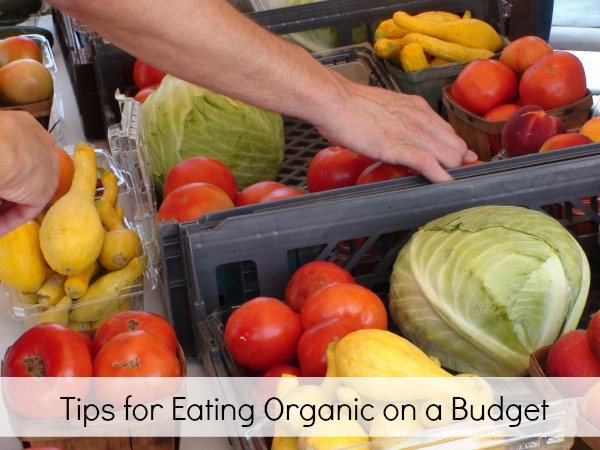I have heard the excuse time and time again (I’m even guilty of giving it myself):
“I wish we could eat organic foods, but I just can’t afford it.”
About four years ago, I decided that we needed to start eating organic. I wanted to do this especially for my young children. So I started switching to organic produce, meats, dairy and wine. What I have found is that by cutting out prepackaged conventional foods and eating with fresh ingredients, my grocery bill has actually decreased. In fact, I have been able to feed our family of four fresh organic meals for $100 per week.
Eating Organic on a Budget
1. Make a menu prior to shopping. Plan meals that will include meat every other day, versus having it in every single dish.
2. Only buy what you need for the week. For example, if I am stuck buying a whole five-pound bag of organic potatoes, because they don’t sell them loose, then I try to plan another meal that will use the remainder of the bag.
3. Don’t make recipes that require excess or specialty ingredients. Many specialty ingredients can be substituted for something else you already have on hand. Don’t be afraid to experiment!
4. Substitute any dinner leftovers as lunch during the week.
5. Stay away from specialty stores! Although they have a great selection of unique items, you typically pay more in your overall bill. For instance, I get my organic poultry cheapest at Shop Rite. Since they don’t carry a large selection of organic produce, I shop for those items at a local organic grocery store. I recommend visiting a few different stores and browsing their organic selection. Take note of their prices to get a feel for which store might save you the most money.
6. Use coupons! Although they are harder to come by, there are organic-based coupons online. Take time to email your favorite companies too, for the opportunity to receive coupons by mail.
7. Learn what is important to buy in organic form and what you can still buy in conventional form. The key is to stay away from as many preservatives, fake sugars, additives and chemicals as possible. The fewer the ingredients, the better for you.
8. Get your apron ready! I try to make a lot of our snacks from scratch. In doing so, most of the food budget can go towards organic produce, meat and dairy. This is much cheaper than buying the organic prepackaged snacks that are often priced as high as $5 per box! To save time, I double the recipe of whatever it is I am making and freeze the second batch for later.
9. Know your limitations. As I am shopping, I actually jot the price of my items down, next to the item name on my shopping list. Before heading to check out, I do a quick add up of my groceries. If I have gone over budget, then we put some of the “non-necessary” items back.
10. Keep it simple. I learned that not every meal has to have a meat, side dish, vegetable and bread. I try to keep it simple, yet healthy, often producing one-dish meals.








Leave a Reply